An SBS Transit Volvo B10BLE CNG registered SBS2988M has been preserved at St. Andrew’s Autism Centre, located at 1 Elliot Road. The decommissioned public bus, first spotted in February 2020, was donated by SBS Transit to support the education of students with special needs.
This bus is one of two known Volvo B10BLE CNG buses to have been preserved, the other being SBS2989K, which resides at Tan Tock Seng Hospital to facilitate patient rehabilitation.
SBS2988M Preservation
The Volvo B10BLE bus was registered on 19 April 2002 as SBS2988M (Chassis Number YV3R4E3122A008449), and it was Singapore’s first Compressed Natural Gas (CNG) powered public bus. The bus was de-registered on 18 April 2019 after reaching its statutory lifespan of 17 years.
After de-registration, the bus was stored at Braddell Bus Park in the 2nd half of 2019.
In February 2020, the bus was spotted at St. Andrew’s Autism Centre, a non-profit organisation for the education, training and care of persons with autism and their families. The Autism Centre premises at East Coast comprises St. Andrew’s Autism School, St. Andrew’s Adult Autism Services, St. Andrew’s Mission Hospital Clinic (Elliot Road) and Chapel of Christ Our Hope.
Donated for Special Needs education
The decommissioned bus was donated by SBS Transit to build the confidence of students with special needs to travel safely and independently on public buses. With the buses on their school
grounds, they learn what to expect and how to manage their way around as part of their training curriculum.
References to SBS2988M preservation can also be found in SBS Transit’s 2o2o Sustainability Report. The other bus donated to a special needs school is a Volvo B10TL (SBS9817C), which resides at APSN Chaoyang School.
Modifications
An air-conditioning unit is mounted on the front headwall of the bus.
All revenue service equipment had been removed when initially spotted in February 2020, but a follow-up visit in August 2022 revealed the installation of decommissioned card readers, presumably as a training aid.
Preserved Singapore buses
- Leyland Olympian (SBS7196Z) – Children’s playbus. Static display at Pat’s Schoolhouse (Jubilee Park); Moved to Pat’s Schoolhouse Katong in 2020 & later scrapped in March 2025.
- Nissan RX102K3 (STC 609) – LTA restoration; former Singapore Traction Company bus
- Leyland Olympian (SBS9168S) – Bought by a private collector and shipped to United Kingdom; local registration L888 SBS.
- Leyland Olympian (SBS6907X) – “The Red Bus” static display outside National Youth Council (Grange Road)
- Volvo B10BLE Bus (SBS2989K) – Used for patient rehabilitation at Tan Tock Seng Hospital – Integrated Care Hub
- Volvo Olympian (SBS7227T) – Former student lounge at Temasek Junior College, scrapped in 2018
- Volvo B10TL (SBS9817C) – Used for special needs education at APSN Chaoyang School
- Volvo B10TL (SBS9844Z) – Bought by a private collector and shipped to Hong Kong
- Volvo B9TL (SBS7376X) – Preserved at ITE College West
- Scania K230UB – 20 buses preserved at The Bus Collective
- Scania K230UB (SBS8033D) – Preserved at St Andrew’s Mission School in Dec 2024
- Scania K230UB (SBS8038R) – Preserved at Maitri School in Dec 2024
Gallery:
See Also
- Mobility Park @ Jurong Community Hospital; where a mock-up MAN A22 bus was custom made for rehabilitation purposes.
Back to Volvo B10BLE
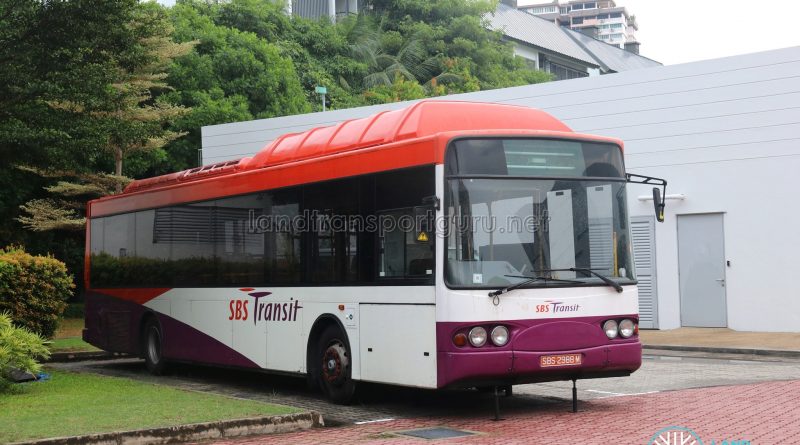
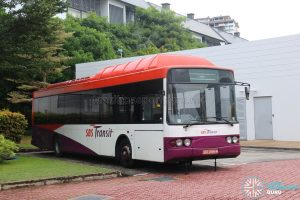
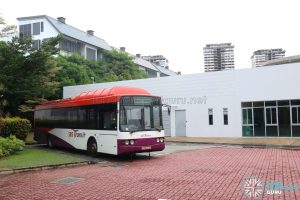
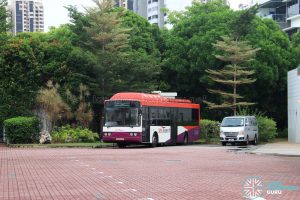
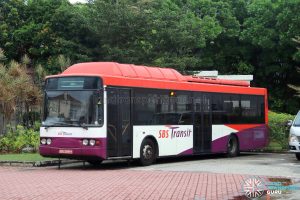
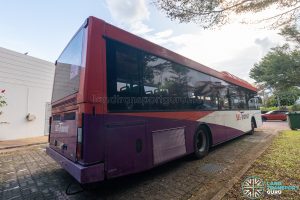
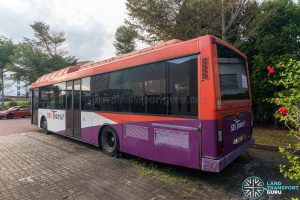
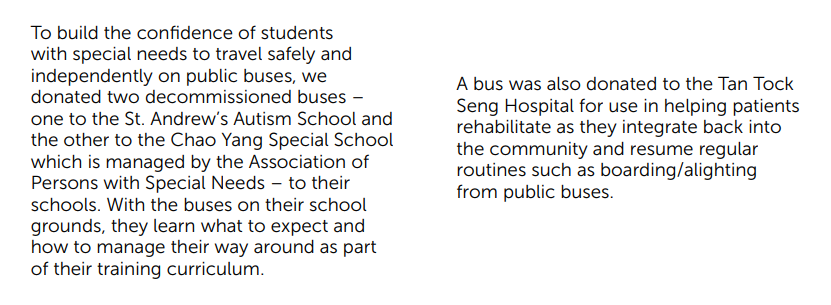
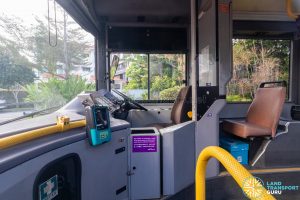
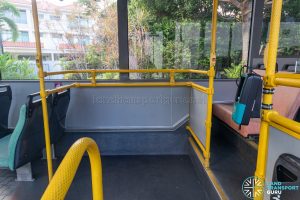
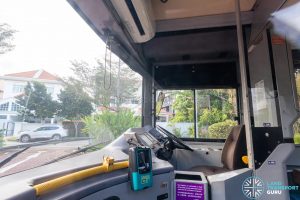
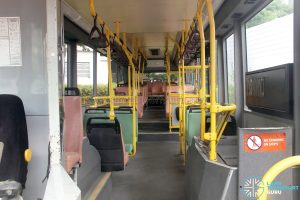
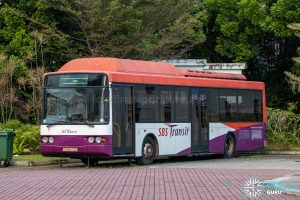
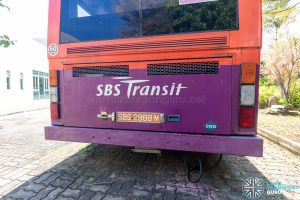
Speaking of technology, nowadays got the VR glasses. Virtual Reality glasses.
If we are able to develop a console that can provide the same kind of training without using the physical public transport vehicles, that would be even better.
But really, it would be better to do real-world training on the actual public transportation.
With guidance, of course, and the related safety measures such as someone on standby to restrain if necessary, to maintain public order.
That is with regards to the people with Autism.
Whereas for the people with Disabilities, for the train, it is to train them to use the lift, as well as take the train. As for the buses, is how to communicate with the bus driver in order to board the bus, as well as how to alight after that.
For both groups of people, it is really better for them to have real-world training.
The crowd, as well as all the other things like announcements and scenary, as well as the overall atmosphere.
Better to have real-world training, as realistic as possible, in order to facilitate recovery, so that these two groups of people would be able to integrate into the society as early as possible, which I believe this is what everyone wants.
For the interests of everyone as well as the people with autism or disabilities themselves. Integration would make it fair for everyone.
But VR consoles can be quite expensive and taking them out to the bus interchange can take up a lot of manpower. So this clever method of using a decommissioned bus for training is relatively cheaper and requires less manpower. It gives them a realistic simulation to people with autism on taking the bus.
Philip Sean,It makes sense for them to do this, if you take them to the actual train station/actual bus it will take up quite a fair bit of manpower.(Taking them to the station etc) At least when they use decommissioned buses for training, it is very convenient as they can just conduct training at the compound itself. Take the Jurong Hospital mobility park as an example. The bus cannot keep the equipment that you would normally see when it was in revenue service (Ez-Link Card Reader,DDU) as they belong to LTA. I’m not sure of other countries have done this before but it is a clever method by SBST to give decommissioned buses a new lease of life. Hope to see more of these!
Guys, I honestly do not agree with this action. After all, this particular bus looks so different than every other bus out there in Singapore.
Also, if it’s for scenario training, the equipments should be kept intact.
I would want to believe that this is a playground, rather than to train the people with autism to help them integrate into the society.
Also, wouldn’t it be much better, in terms of cost effectiveness and training objectives, to just charter a public bus with bus captain for a period of time for the purpose of training?
Same goes for the health care institutions that are acquiring decommissioned buses to train people to integrate into the society.
Whereas for train, if they want, they can also do training at the actual train stations and actual trains, at the terminal stations where the trains usually stop for a longer period of time. Especially Tuas Link, Marina Bay and Marina South Pier which has the lowest number of passengers among all the terminal stations.
Which would be much more effective.
Anyway, I don’t believe other countries are acquiring decommissioned public transport vehicles for integration training.
If there are, please tell me. Thanks.
Philip, first of all, the bus there acts as an equipment to teach those with autism how to behave in public transportation. You saying its a playground contradicts the school mission to help those with autism integrate into the society. All I can say is I have done IT projects catered towards those with autism (I.e creating something that would allow them to learn electronically). I cant say if my project given was created for this school as well (If you get what I am hinting).
Secondly, you mentioning chartering means to me that you are only talking about 1 time off training.
This bus is lucky to escape from getting scrapped thanks to the TTSH.
Are we allowed to visit this bus anytime?
You can attend their services on sunday mornings
I mean anytime of the day can we visit other than sunday mornings, let’s say we’re there to visit the bus only.
You ask the wrong people already. We also not the Autism school people.
You should ask the Autism school people, by sending an email or calling their number.
Details should be at their website.